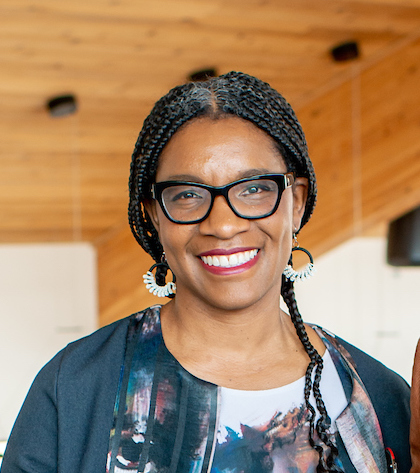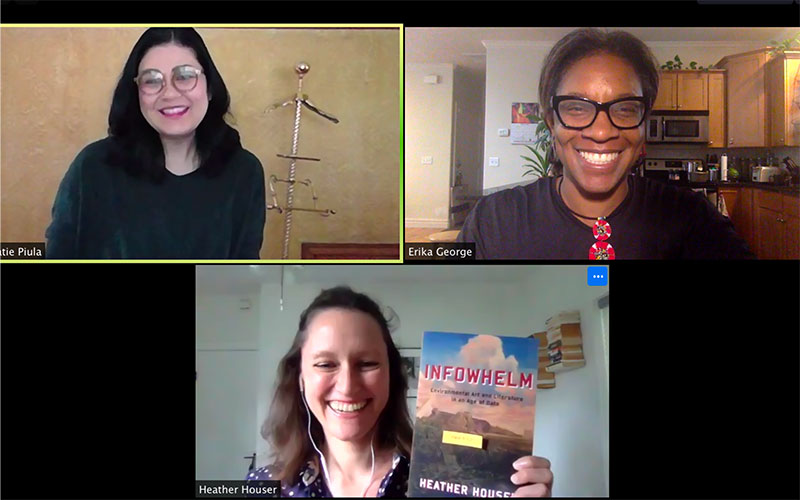A Message from Director Erika George
 Dear Tanner Humanities Community,
Dear Tanner Humanities Community,
I hope my message finds you and yours safe and well. As the world continues to adapt
and adjust to the changes and challenges caused by the Coronavirus (COVID-19) pandemic
we continue to keep you in our thoughts.
While the Tanner Center remains closed to ensure the safety of our staff and patrons,
this month we bid farewell to our 2019-2020 research fellows and gear up to welcome
our 2020-2021 research fellows. The Tanner Humanities Center's mission is to promote
humanistic research and education at the University of Utah, in the state, and in
the nation.
Each year, with assistance from the Tanner Humanities Center Faculty Advisory Board,
a group comprised of distinguished faculty from a variety of humanities disciplines,
we select faculty and students who demonstrate excellence and represent a variety
of different disciplines and methodologies to spend up to a year in residence with
us. The purpose of our research fellowship program is to stimulate and support high
quality humanistic research by providing faculty and students the necessary time,
space, and other resources to advance their work.
Despite the changing and challenging circumstances that we confronted Spring semester,
the Tanner Fellows managed to create and sustain a supportive and generous intellectual
community. Catherine Mayes of the School of Music dazzled us with her exploration
of the diversity of music scene in Vienna from 1750-1810 as Hungarian Dances served
to popularize and democratize public performing arts. Maureen Mathison of the Department
of Writing and Rhetoric challenged us with her examination of the rhetoric of controversy
in the scientific community using primary sources to show how social context features
in negotiating scientific consensus. Brandon Clark, a graduate student in the Department
of History, shared his ambitious dissertation research on the environmental history
of the colonial Americas. Melissa Parks, a graduate student in the Department of Communication,
presented a portion of her dissertation exploring the use of scientific rhetoric and
appeals to genetics in environmental conservation advocacy. Cori Winrock, an accomplished
poet and graduate student in the Department of English, shared a thought-provoking
digital humanities experiment combining textile traditions and code to demonstrate
how interactive platforms expand the possibilities of the “page” and narrative. Graduate
student Sasha Coles joined us from the Department of History at the University of
California Santa Barbara as our Graduate Research Fellow in Latter-Day Saints Studies.
Her dissertation project tracing the history of silk production and women’s work provided
us with an enriched understanding of economics, religious liberty, the Utah landscape
and Utah’s unique place in the global marketplace. Our Honors College Undergraduate
Research Fellow Andrew Hayes from the Department of Philosophy considered the eternal
and important questions of self-knowledge and agency. We thank each of our Fellows
for engaging us with important, novel, and interesting research. Please watch for
news about our incoming research fellows in the coming months.
Tanner Humanities also hosted Andrew Lloyd from the University of Texas San Antonio
and as our Marlin K. Jensen Artist and Scholar in residence brought guest composers
together with lifelong learners to experience liturgical selections as part of his
Latter-Day Saints and the Musical Arts project. Tiffany Higgins joined us as the Annie
Clark Tanner Teaching and Research Fellow in Environmental Humanities. We appreciate
the time our guests shared with us.

(From left to right) Katie Piula, Marketing/Communications Coordinator;
Erika George,THC Director;
Heather Houser, Former Fellow and Author of "Infowhelm"
Until we can safely go back to the Center we will be looking back and sharing recent
news about the people and programs that make Tanner Humanities such a special place.
This month we feature the work of former Tanner Humanities Fellow Heather Houser to
celebrate her important and timely new book Infowhelm. As we celebrate our nation’s independence, I’ve been reflecting on how critical
information is to self-governance in a free society. We have greater access to more
information than at any point in human history. Yet, misinformation and disinformation
abound making discerning truth from fiction, and actual facts from alternative facts
more difficult. Heather’s work helps us to understand how we make sense of the world
and how we create knowledge.
In times like these, our shared humanity, our ability to solve complex problems with
creativity, our capacity for empathy and hope, and our deep connections to one another
and our global community — capacities we best acquire through exposure to the humanities
— are more important than ever. We hope you will take time to enjoy National Theater
rebroadcasts. This month we look forward to Lorraine Hansberry’s Les Blancs a reflection on reckoning with conflicts concerning racism, colonialism, identity,
family and nation.
We value our relationship with you. We appreciate your support and we look forward
to seeing you again in person. Please follow us on social media for our updates and
information on arts and culture activities available to you online. Please feel free
to contact us to share your ideas. We would love to hear from you.
Sincerely,
Erika Geroge
